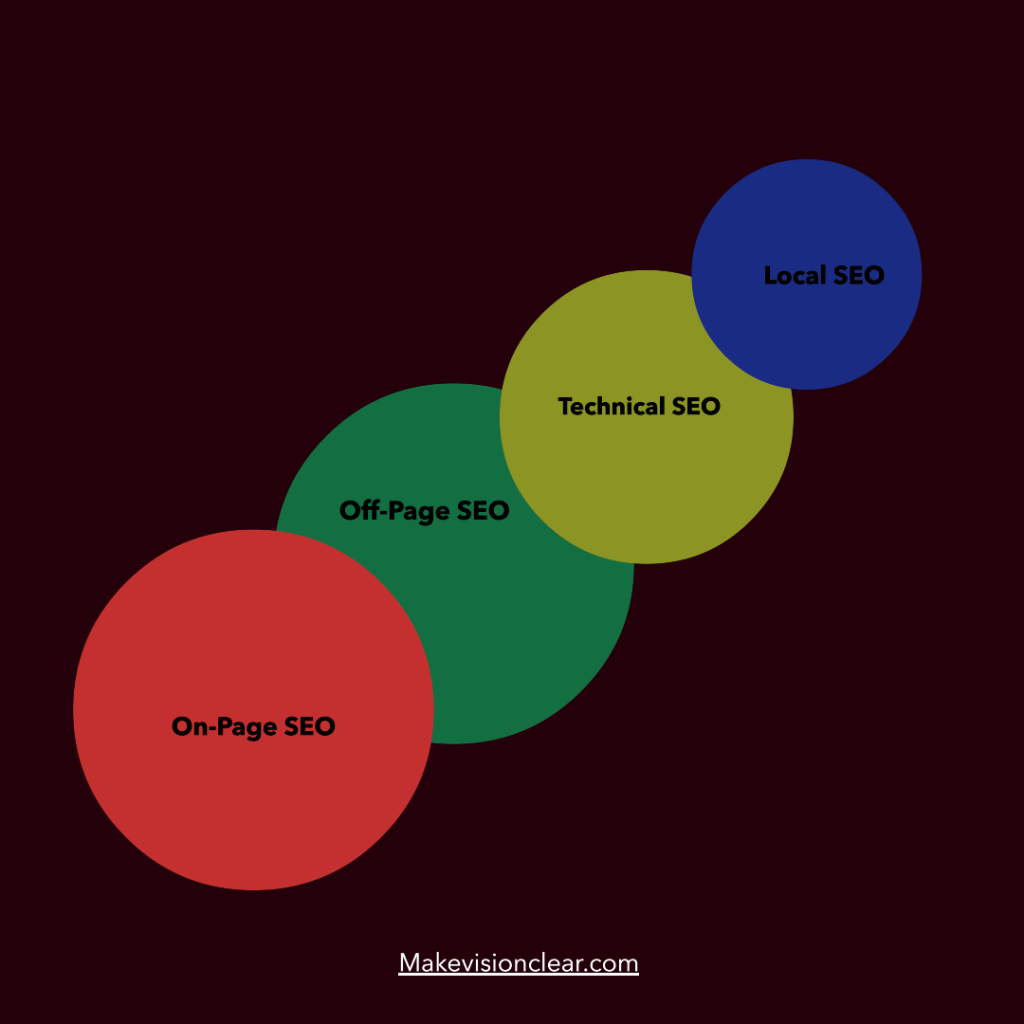In the contemporary digital epoch, SEO is super important if you want your business to succeed. Why? Because SEO helps people find you more easily on Google or other search engines. This way, more people visit your website, and you end up making more money. So, what is SEO, how do search engines like Google work, and what do you need for good SEO? Let’s break it down.
Understanding the Basics of SEO

Search Engine Optimization, or SEO, is a complex process that involves a range of techniques and strategies aimed at improving the visibility of websites and online content on search engine result pages (SERPs). SEO is crucial for businesses and individuals alike who want to increase their online presence and reach a wider audience.
What Does SEO Stand For?
As mentioned earlier, SEO stands for “Search Engine Optimization.” It is the practice of optimizing websites and online content to improve their ranking on search engine result pages (SERPs).
The goal of SEO is to increase the visibility of websites and online content, making it easier for users to find them when searching for relevant keywords or phrases.
SEO involves a range of techniques, including keyword research, link building, on-page optimization, and more. By implementing these techniques, businesses, and individuals can improve their search engine rankings and attract more organic traffic to their websites.
Why Is SEO Important?
SEO is crucial because the majority of online experiences start with a search engine. In fact, studies show that over 90% of online experiences begin with a search engine. This means that if your website does not appear on the first page of search results, the chances of users clicking on it are slim. Thus, SEO efforts aim to increase the visibility and ranking of websites on SERPs.
SEO is also important because it helps businesses and individuals compete in an increasingly crowded online marketplace. With millions of websites and online content competing for attention, it’s essential to have a strong SEO strategy to stand out from the crowd.
Organic vs. Paid Search Results
There are two main types of search results: organic and paid. Organic search results are listings on search engine result pages that appear based on relevance to the user’s search terms. These listings are not paid for and are based solely on the relevance and authority of the website and its content.
Paid search results, on the other hand, are advertisements that appear above or below organic search results. These ads are paid for by businesses and individuals who want to appear at the top of search results for specific keywords or phrases.
While both organic and paid search results can be effective for driving traffic to websites, organic search results are generally considered more valuable because they are based on relevance and authority rather than paid placement. However, paid search can be a useful tool for businesses and individuals who want to quickly increase their visibility on search engine result pages.
See also: Best Way To Execute A Programmatic SEO For Startups
How Search Engines Work
Search engines have become an integral part of our daily lives. They help us find information, products, and services quickly and easily. But have you ever wondered how search engines work? In this article, we will explore the inner workings of search engines and how they deliver search results.
Crawling and Indexing

Search engines use software programs called crawlers (also known as spiders or bots) to scan the internet and collect information about websites.
These crawlers follow links from one page to another, collecting data about each page they visit. The data collected includes the page’s content, images, videos, and other relevant information.
Once the crawlers have collected the data, they store it in a database. This database is known as the search engine’s index. The index is used to deliver search results when a user enters a search query.
It’s important to note that not all websites are crawled and indexed by search engines. Websites with poor content, broken links, or other technical issues may not be indexed. It’s essential to ensure that your website is optimized for search engines to increase your chances of being indexed.
Ranking Factors
Search engines use complex algorithms to determine the relevance and importance of each website’s content. These algorithms examine various ranking factors. Some of the most important ranking factors include:
- Keyword usage: Search engines look for keywords in the content, title, and meta tags of a website to determine its relevance to a search query.
- Website speed: Websites that load quickly are preferred by search engines and users alike.
- Mobile-friendliness: With the rise of mobile devices, search engines prioritize websites that are optimized for mobile devices.
- Backlinks: Backlinks are links from other websites to your website. Search engines view backlinks as a sign of authority and relevance.
These are just a few of the many ranking factors that search engines use to determine a website’s relevance and importance. It’s essential to optimize your website for these ranking factors to improve your search engine rankings.
Search Engine Algorithms
Search engine algorithms are sets of rules and procedures used by search engines to deliver relevant search results. These algorithms are regularly updated to improve the accuracy and effectiveness of search results.
One of the most well-known search engine algorithms is Google’s PageRank algorithm. PageRank uses a complex formula to determine the importance of a website based on the number and quality of backlinks it has. Learn 15 Ways to Build Free Backlinks That Actually Get Results.
Other search engine algorithms include Google’s Hummingbird, Penguin, and Panda algorithms. These algorithms focus on different aspects of search engine optimization, such as keyword usage, content quality, and website structure.
It’s important to stay up-to-date with search engine algorithm updates to ensure that your website remains optimized for search engines.
See also: 2023 SEO Trend Predictions
Key Components of SEO
Search Engine Optimization (SEO) is a crucial aspect of digital marketing that helps businesses improve their online visibility and attract more traffic to their websites. SEO involves a range of techniques and strategies that aim to improve a website’s ranking in search engine results pages (SERPs). Here are the three key components of SEO:

1. On-Page SEO
On-page SEO involves optimizing the content and structure of a website’s pages to rank higher in search results. This includes techniques such as keyword research, optimizing meta titles and descriptions, internal linking, image optimization, and formatting content for readability and user engagement.
Keyword research is the process of identifying the keywords and phrases that people use to search for products or services related to your business. By optimizing your website’s content with these keywords, you can increase your chances of ranking higher in SERPs.
Optimizing meta titles and descriptions involves creating compelling and informative titles and descriptions for each page of your website. This helps search engines understand what your website is about and encourages users to click through to your website.
Internal linking involves linking to other pages on your website. This not only helps users navigate your website but also helps search engines understand the structure of your website and which pages are most important.
Image optimization involves using appropriate file sizes, alt tags, and descriptive file names to make images on your website easily searchable and accessible to search engines.
Formatting content for readability and user engagement involves using headings, subheadings, bullet points, and other formatting techniques to make your content easy to read and understand. This not only helps users engage with your content but also makes it more likely that search engines will rank your website higher in SERPs.
2. Off-Page SEO
Off-page SEO includes activities that take place outside of a website, such as link building and social media marketing. It aims to improve the website’s authority and reputation, making it more likely to rank higher in search results.
Link building involves getting other websites to link to your website. This not only drives traffic to your website but also signals to search engines that your website is authoritative and relevant.
Social media marketing involves using social media platforms to promote your website and engage with your audience. This not only helps build your brand but also generates social signals that can improve your website’s ranking in SERPs.
See also: The Ultimate Bing SEO Guide: Boost Your Ranking Today
3. Technical SEO
Technical SEO involves optimizing a website’s back-end elements to improve its visibility and ranking in search results. This includes optimizing website structure, improving page speed, ensuring mobile-friendliness, and implementing structured data, XML sitemaps, and HTTPS.
Optimizing website structure involves organizing your website’s content in a logical and hierarchical manner. This not only helps users navigate your website but also makes it easier for search engines to crawl and index your website.
Improving page speed involves optimizing your website’s code and server settings to reduce page load times. This not only improves user experience but also signals to search engines that your website is fast and reliable.
Ensuring mobile-friendliness involves optimizing your website’s design and content for mobile devices. With more and more people using mobile devices to browse the internet, having a mobile-friendly website is crucial for improving your website’s ranking in search results.
Structured data involves using schema markup to provide search engines with additional information about your website’s content, making it easier for search engines to understand your website and improve its visibility in SERPs.
XML sitemaps provide search engines with a roadmap of your website’s pages, helping search engines crawl and index your website more efficiently.
HTTPS is a security protocol that encrypts the data transmitted between a website and its users. Implementing HTTPS is crucial for ensuring that your website is secure and trustworthy, and it also signals
4. Local SEO
Local SEO is a crucial component of SEO for businesses that rely on local customers. It involves optimizing a website to rank higher in local search results, such as Google Maps, and other local directories. Local SEO strategies include claiming and optimizing local business listings, generating positive customer reviews, creating local content, and building local citations.
Claiming and optimizing local business listings involves creating or claiming your business listings on various local directories, such as Google My Business, Yelp, and Yellow Pages. By optimizing these listings with accurate and up-to-date information, businesses can improve their visibility in local search results and attract more local customers.
Generating positive customer reviews is essential for building a positive reputation and improving your website’s ranking in local search results. Encouraging customers to leave reviews on local directories can help businesses gain valuable feedback and attract new customers.
Creating local content, such as blog posts, articles, and videos, can help businesses establish themselves as local authorities and attract more local traffic to their website.
Building local citations involves getting your business listed on various local directories and websites, such as local newspapers, blogs, and community websites. These citations can help improve your website’s visibility in local search results and establish your business as a local authority.
By implementing these key components of SEO, businesses can improve their online visibility and attract more traffic to their websites. However, SEO is an ongoing process that requires constant monitoring and optimization to stay ahead of the competition.
Developing an Effective SEO Strategy
Developing an Effective SEO Strategy begins with understanding the key components that contribute to your website’s visibility and online success. Let’s take a closer look at the effective SEO strategy for enhancing your website’s visibility and online presence.
Keyword Research
Keyword research is the process of identifying the most relevant and high-traffic search terms for your website. These terms are used to optimize website content and improve rankings in search results.
Content Creation and Optimization
Content is the core of SEO. By creating high-quality, engaging content that is optimized for search engines, businesses can improve their search rankings and attract more website traffic.
Technical SEO
Technical SEO involves optimizing your website’s structure, URLs, and meta tags, among other elements, to improve your website’s speed, mobile responsiveness, and overall user experience. You need to ensure that your website is mobile-friendly, has a clear site structure, and is easy to navigate. You should also optimize your website’s URLs and meta tags to make them more search-engine friendly. Technical SEO is essential for improving website usability and user experience.
Link Building
Link building involves acquiring links from other websites to your own. This technique aims to improve the authority and relevance of a website, making it more likely to rank higher in search results.
Tracking and Analysis
This involves monitoring your website traffic and search engine rankings regularly to determine the effectiveness of your SEO strategy and make necessary adjustments. Use website analytics tools like Google Analytics to track your website’s performance.
You can track your keyword rankings, measure the quality of your backlinks, and identify any technical issues that may be affecting your website’s rankings. By analyzing this data, you can determine which strategies are working and which ones need improvement.
Overall, SEO is a vital component of a successful online business strategy. By optimizing your website and improving its visibility on search engine result pages, you can attract more customers, generate more revenue, and stay ahead of your competition.
See also: Get Your Website Noticed With These Powerful SEO Hacks
What Are Some Common SEO Mistakes to Avoid?
When it comes to SEO, there are certain mistakes that can seriously impact your search engine rankings. By avoiding these common pitfalls, you can improve your visibility and drive more traffic to your site. Here are some of the most common SEO mistakes to avoid:
- Failing to conduct proper keyword research and targeting the wrong keywords or using them unnaturally
- Neglecting on-page optimization factors like meta tags, header tags, and image alt tags
- Not creating high-quality, engaging content that meets the needs and interests of your target audience
- Ignoring technical SEO factors like website speed, mobile-friendliness, and site architecture
- Using black hat SEO techniques like keyword stuffing, cloaking, and link schemes
One of the biggest mistakes is failing to conduct proper keyword research. Targeting the wrong keywords or using them in an unnatural way can seriously hurt your search visibility and prevent your website from being seen by the people who would benefit most from it.
Another common mistake is neglecting on-page optimization factors, such as meta tags, header tags, and image alt tags. These elements are vital for providing search engines with information about the content of your pages, which can make a big difference in how your site ranks.
It’s also important to make sure your content is high-quality and engaging. Without content that is both valuable and well-written, your website will struggle to attract and retain visitors.
Ignoring technical SEO factors like website speed, mobile-friendliness, and site architecture is another common mistake. These factors can have a big impact on how search engines crawl and index your site, so it’s important to make sure that your website is technically sound and optimized for search engines.
Finally, it’s crucial to avoid black hats SEO techniques like keyword stuffing, cloaking, and link schemes. These tactics can result in your website being penalized by search engines, which will hurt your credibility and search engine rankings.
Avoiding these mistakes and focusing on creating high-quality content that appeals to your target audience, while also optimizing your site for search engines, can help improve your search engine rankings and drive more traffic to your site.
Conclusion
Search engines play a vital role in our daily lives, as they provide us with the information we need at our fingertips. With the increasing reliance on search engines, it is crucial to understand how they work.
This knowledge can help you optimize your website for better search engine rankings, resulting in increased visibility and more visitors to your website.
By following best practices for search engine optimization, such as incorporating relevant keywords, creating high-quality content, and building quality backlinks, you can enhance your website’s chances of ranking higher in search engine results.
At Make Vision Clear, we understand the importance of search engine optimization for businesses looking to succeed online.
Our team of experienced digital marketing professionals can help you enhance your website’s online presence, increase your search engine rankings, and drive more leads and sales to your business.
We specialize in developing custom digital marketing strategies tailored to meet the specific needs of your business. So why let your competitors get ahead? Contact us today, and let us help you make your vision clear by boosting your online visibility and driving growth to your business.

